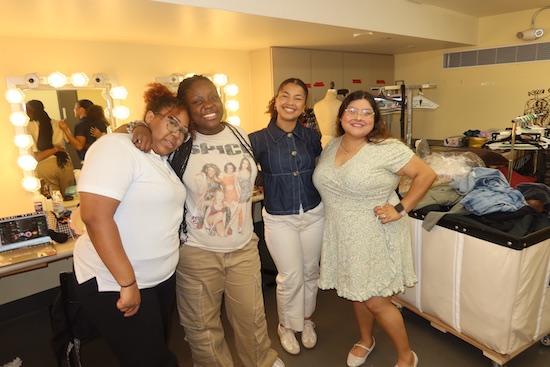
c/o Andrea Herrera
This article covers a production which included the use of racial slurs and themes of racism, sexism, and misogyny.
Last Friday evening, I joined a crowd of students, parents, and alumni to watch the opening performance of “disadvantage (n.),” presented by SHADES, the University’s theater collective for students of color, in the Patricelli ’92 Theater. This Homecoming + Family Weekend was a wonderful reminder of the abundance of talent within our student body, with “disadvantage (n.)” joining Spike Tape’s “After Eurydice”—which will be covered in the Arts section later this week—for a student-written theater double headliner weekend.
“disadvantage (n.)” follows Lauren Smith (Kayla Raphael-Shirley ’27), the associate director of the National Debate Society, as she investigates the days leading up to the debate state championship tournament at which a white student, Annie Kirkfield (Emma Moyer ’28), yelled a racial slur at two of her Black opponents—Saryiah Ball (Samantha Farrow ’27) and Jay Johnson (Celeste McKenzie ’27). After a recording of the incident goes viral, Annie’s parents, who are major donors to the National Debate Society, demand that the society’s director—and Lauren’s husband—launch an investigation and punish the students who recorded and posted the video.
Like all student theater, writing “disadvantage (n.)” was a labor of love for writer-director Senica Slaton ’26, who sought to interweave her own experience of high school debate with the larger themes she wanted to tackle through the show.
“It was kinda hard because there were so many…little things [about debate] that I could have added, but I had to stay focused on what mattered most to the plot,” Slaton wrote in an email to The Argus. “But also I didn’t want to over-explain for the audience, because it’s not all about debate, it’s about the words used. And that was a hard balance to find at first and was a lot of trial and error.”
Over the course of her investigation, Lauren conducts a series of interviews with the three young women at the center of the scandal: Annie, Saryiah, and Estrella Ruiz (Andrea Herrera ’27). In an unconventional narrative structure, the play flashes back and forth between Lauren’s interviews and the various debate tournaments as the girls describe them to her.
As the interviews begin, Lauren quickly realizes that she’ll have to work to gain the girls’ trust if she wants to discover what really led to Annie’s racist outburst. Raphael-Shirley’s thoughtful performance brought life to Lauren’s internal conflict as she tried to understand not only the incident at the center of the investigation, but also how she failed to create a safe space for Black girls in the organization that she’s worked so hard to change.
During an interview with Estrella, portrayed by Herrera with the exact balance of absurdity and melodrama one would expect from a 16-year-old debate student, Lauren learns that another white student, Ben Williams (Nathaniel Atkin ’27)—Estrella’s ex-boyfriend and debate partner—also called Estrella a racial slur after losing the semi-final tournament to Annie and her brother Adam (Stuart Conrad ’26). As Estrella pours her heart out to Lauren, grappling aloud with the guilt and shame she feels for still having feelings for Ben, even after he’s verbally assaulted her in public, Lauren relates her own complicated experiences in relationships with white men, reaching the climax of the play with her telling the audience of her husband’s recent infidelity.
Meanwhile, Saryiah and Annie both deal with the fallout of their confrontation, now on the internet for the world to watch over and over again. While Jay is more than happy to post the video of Annie’s racist tantrum, Saryiah is more reflective in the wake of the traumatic experience. She spends the play pondering whether her fiercely competitive nature and ruthless debate style pushed Annie to the edge, and if exposing her competitor’s worst moment is just as hateful as Annie and Ben’s words.
Annie, on the other hand, finds herself without a friend in the world following her outburst. Ben breaks off their budding relationship after he loses to her in the semi-final competition. Her brother casually abandons her with a stinging quip—“See you later, racist”—which Conrad delivered to uproarious laughter. And her best friend, Alyssa Pearl (Juno Wright ’27), another Black student, has sworn never to speak with her again. Having reflected on her mistakes, Annie remorsefully pleads with Lauren not to reveal the identity of the student who posted the video of the incident to her parents. While she grows to understand the wrongness of her actions because of the consequences she faces, Annie still has a long way to go to reconcile with the people she’s hurt, as she hasn’t even apologized to Saryiah and Jay by the end of the play.
The story ends with Lauren confronting her best friend and secretary Grace White (also portrayed by Moyer), who has been having an affair with Lauren’s husband. After we’ve witnessed Lauren’s patient and contemplative demeanor throughout the show, Raphael-Shirley’s final monologue was a welcome 180, creating a moment of triumph as Lauren stood her ground and demanded respect from her colleague for the first time in the show. It felt as though she finally reclaimed the agency and pride that she lacked when she was in Saryiah and Estrella’s shoes.
Ultimately, “disadvantage (n.)” brought its audience into the complex and quirky world of high school debate and delivered poignant, timely messages about navigating the nuances of race and gender in the United States as a teenage girl. I left with a sense of pride that I survived the teenage girl experience myself, figuring out each obstacle life threw at me with unexpected expertise beyond my years, and all the while being just a girl.
Sulan Bailey can be reached at sabailey@wesleyan.edu.